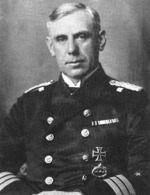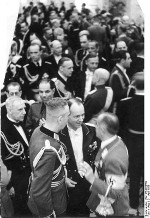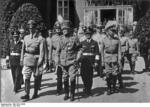Wilhelm Canaris
| Surname | Canaris |
| Given Name | Wilhelm |
| Born | 1887 |
| Died | 9 Apr 1945 |
| Country | Germany |
| Category | Government |
| Gender | Male |
Contributor: C. Peter Chen
ww2dbaseWilhelm Franz Canaris was born in Aplerbeck, near Dortmund, in Westphalia, Germany. Part-Greek, he considered himself a distant relative of Greek naval officer Constantine Kanaris of the 19th Century, but genealogical evidence had never been found linking the two admirals. In 1905, he joined the German Imperial Navy. He served aboard the cruiser Dresden as her intelligence officer during WW1. In 1915, when the ship was disabled by the British Royal Navy and scuttled, he escaped capture and returned to Germany after a three-month journey. He served the remainder of WW1 as a successful submarine commander in the Mediterranean. During the inter-war years, he joined the para-military Freikorps organization as he remained in the Reichsmarine. In the early 1930s, he became the executive officer of the cruiser Berlin, then the commander of the battleship Schlesien, while resuming doing intelligence work.
ww2dbaseOn 1 Jan 1935, Canaris' experience in the intelligence field led him to the appointment as the head of Abwehr, Germany's military intelligence agency with a promotion to the rank of rear admiral later that year. Immediately, he set out to establish a spy network in Spain for German interests; he was the main person behind the decision for German to side with Francisco Franco in the Spanish Civil War. While a supporter of Adolf Hitler during his rise, viewing him as staunch leader against communism, by 1938 he had realized the true face of Hitler and began to work against the Nazi state. He sabotaged the process to absorb Czechoslovakia into German borders, and convinced Franco from forming formal alliances with Germany. In the year leading up to the start of the European War, he started to maintain contact with British intelligence agency MI6. He also began to take on a leadership role among a group of German officers who shared similar unfavorable views on Hitler.
ww2dbaseWitnessing the atrocities committed by the Germans, Canaris protested. In regards to the use of forced labor, he said that
ww2dbaseSeeing little results from his protests, Canaris slowly stepped up his work against the Nazi regime while still maintaining his front as a loyal subject. In Jan 1940, he was promoted to the rank of a full admiral, but by this time he was a leadership figure of a group of anti-Nazi military officers who shared similar goals against Hitler. Reinhard Heydrich and Heinrich Himmler began to place suspicion on Canaris, but no concrete evidence was found. Between 1942 and 1944, Canaris frequently traveled away from Berlin; historians deducted that he was likely meeting with British agents when he visited Spain and France. Meanwhile, he gave token training to a large number of people, including hundreds of Jews, so that he could send them outside Germany as spies; many of them simply disappeared after leaving the country. It was said that Canaris used this route to help many people escape Nazi persecution. Heydrich, who continued to suspect Canaris and at many occasions tested Canaris' loyalty, was said to be assassinated by MI6 to protect Canaris.
ww2dbaseIn 1943, Canaris met Otto Skorzeny for the first time. Skorzeny observed:
ww2dbaseIn Feb 1944, Himmler convinced Hitler to relief Canaris from his command. Without Canaris, the Abwehr soon merged into the Sicherheitsdienst (SD). He was placed under house arrest as evidences linking him to other conspirators were found, but both Hitler and Himmler had their reasons to keep him alive for a while. Hitler wished to use him to find the identities of even more conspirators, while Himmler might had wished to use Canaris to establish communications with the British when it became necessary for Himmler to defect. On 9 Apr 1945, he was executed by strangulation at Flossenbürg concentration camp. At the time of his execution, Canaris was decorated with the Iron Cross First and Second Class, the Silver German Cross, the Cross of Honor and the Wehrmacht's Twelve and Twenty-Five Year Long-Service Ribbons.
ww2dbaseSources:
William Manchester, The Arms of Krupp
Otto Skorzeny, Skorzeny's Special Missions
Wikipedia
Last Major Revision: Dec 2006
Wilhelm Canaris Interactive Map
Photographs
 |  |  |
Wilhelm Canaris Timeline
| 1 Jan 1887 | Wilhelm Canaris was born. |
| 1 Jan 1935 | Admiral Canaris was appointed head of the German Abwehr (Military Intelligence Department). |
| 23 Jul 1944 | The German Gestapo arrested the head of German Abwehr Wilhelm Canaris. |
| 6 Apr 1945 | Adolf Hitler read Wilhelm Canaris' diary in which Hitler he learned of Canaris' involvement in anti-Nazi activities. |
| 7 Apr 1945 | Wilhelm Canaris was sentenced to death by a special SS tribunal. |
| 9 Apr 1945 | Wilhelm Canaris was executed by hanging by piano wire at the Flossenbürg concentration camp in Flossenbürg, southern Germany. |
Did you enjoy this article or find this article helpful? If so, please consider supporting us on Patreon. Even $1 per month will go a long way! Thank you. Share this article with your friends: Stay updated with WW2DB: |
Visitor Submitted Comments
29 May 2008 06:16:15 PM
Regarding Canaris, there exists much evidence he may have been part Greek, but I was wondering if you had come across a reputable source in this area.
9 Nov 2008 04:20:31 AM
For your information, there is an online photo resource about Wilhelm Canaris:
http://canaris.fotopic.net
I thought you might find this useful.
Cheers,
Jan
24 Mar 2011 10:59:30 AM
this website is great@ :)
29 Aug 2012 02:20:45 AM
Like many Germans of his generation, Canaris was deluded into believing that Hitler would restore the glories of the Imperial past, in which he had grown up, and he was already a convinced Nazi when he was suddenly appointed to the Abwehr at the moment that his active naval career cane to an end. His ostensible qualification for the post – he had played a leading part in the work of under-over agents, particularly in Spain, since 1925 – was really a disqualification; false names and all the other stock-in-trade of the spy fascinated him, but he could not organise others to do the work and report back to him. He disliked and avoided the laborious but necessary desk-work inseparable from the sifting of contradictory items of intelligence, and he grew more and more fatalistic, resigned and lazy as he gradually realised that Hitler was leading Germany to destruction.
Under him, the Abwehr was far less efficient than was supposed at the time. It made serious mistakes galore; Canaries never realised that the British controlled all his agents in England, and for lack of anything better, he had to plan the invasion of Norway from a 1907 manual. The Abwehr provided no useful intelligence before the 1940 campaign in France and knew nothing of the Red Army’s order of battle before Barbarossa (because he had slavishly obeyed Hitler’s 1939 order not to annoy the Russians), and finally he made one of his most fatal errors about Allied intentions in the Mediterranean, shortly before Anzio, when he assured Kesselring that there was no likelihood of an Allied landing behind his lines in the near future.
Canaris was even less effective as an opponent of the Nazi regime. Disillusioned with Hitler after the Blomberg-Fritsch scandals of 1938 and increasingly under the influence of his subordinate, Oster, Canaris grew convinced that Germany was doomed. He associated with Anti-Hitler plotters until the outbreak of war, but his inaccurate forecasts that England would call Hitler’s bluff at Munich (and thereby so discredit him) that Hitler would fall from power without any action on their part that he took no advantage of his prior knowledge about Barbarossa to issue any warnings. Additionally he became so mesmerised by fear that the enemy might deal Germany a mortal blow if internal disorder broke out that he grumbled aloud about the Nazi regime, but physically did nothing.
Canaris’ blindness to reality ranged from his flawed belief that contact with the Allies could lead to an arrangement whereby Germany could sacrifice Hitler but preserve everything else, to his failure to destroy the incriminating papers that eventually led to his brutal execution in the final days of the Third Reich.
21 Apr 2015 10:44:27 AM
it doesn't even talk about his personal life...
4 Jun 2015 10:06:25 AM
Wilhelm Canaris had Italian ancestry also.
27 Nov 2016 12:36:01 AM
Hopefully someone can inform me a bit more about this; I've read that Canaris supposed to have informed gen.Meyer about the meaning of the Verlaine verses for D-Day already in January 1945. I would like to know from whom did hé got that info and how ? Thanks and greetings from Holland
7 Dec 2016 12:37:33 PM
I would be grateful for any information relating to Canaris' alleged contact with Lydia Stahl, a Soviet spy.
16 Mar 2018 11:38:26 AM
Does anyone know if his diaries are public or how I could reach them?
All visitor submitted comments are opinions of those making the submissions and do not reflect views of WW2DB.
- » WW2DB's 20th Anniversary (29 Dec 2024)
- » Wreck of USS Edsall Found (14 Nov 2024)
- » Autumn 2024 Fundraiser (7 Nov 2024)
- » Nobel Peace Prize for the Atomic Bomb Survivors Organization (11 Oct 2024)
- » See all news
- » 1,150 biographies
- » 337 events
- » 44,024 timeline entries
- » 1,242 ships
- » 350 aircraft models
- » 207 vehicle models
- » 375 weapon models
- » 123 historical documents
- » 260 facilities
- » 470 book reviews
- » 28,612 photos
- » 432 maps
James Forrestal, Secretary of the Navy, 23 Feb 1945
Please consider supporting us on Patreon. Even $1 a month will go a long way. Thank you!
Or, please support us by purchasing some WW2DB merchandise at TeeSpring, Thank you!
30 Oct 2006 06:26:09 PM
Fix the grammar.